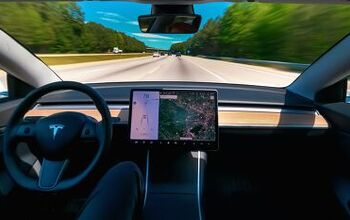Fueling the Opposition: EPA Staff Had Serious Reservations About CAFE Rollback Proposal

Staff at the Environmental Protection Agency had major disagreements over the decision to rollback corporate average fuel economy (CAFE) standards for the coming years, according to documents released last week. The matter echoes an event in May where science advisers for the EPA claimed the agency had ignored its own research in order to rationalize the push to relax fuel targets.
Both items have given ammunition to critics of the new proposal to claim the choice was politically motivated and based upon shoddy, biased research. Interesting, considering that’s exactly what the current administration said about the earlier decision to make them more stringent.
Led by the National Highway Traffic Safety Administration and backed by EPA, the current proposal seeks to keep fuel economy standards at 2020 levels — rather than continuing to elevate them. The arguments made for the move revolved around existing consumer preferences and saving lives. However, some of the agency’s staff seemed to be concerned with the NHTSA’s data and claimed it had overstepped by including the EPA in documents it didn’t approve of.
In the most glaring example, a paper called the Preliminary Regulatory Impact Analysis (RIA) was sent to the White House’s Office of Management and Budget. EPA staffers wanted the agency’s name removed. “This Preliminary RIA is a work product of DOT and NHTSA, and was not authored by EPA,” wrote staffer William Charmley in an email. “[The] EPA’s name and logo should be removed from the DOT-NHTSA Preliminary Regulatory Impact Analysis document.”
A critical analysis of the proposal also saw the EPA correcting “erroneous and otherwise problematic elements of the model’s logic and algorithms.” However, the Department of Transportation suggested that the agency had been using outdated models and overestimating the future size of the automotive market and how much people would be driving. Ultimately, the DOT and NHTSA got their way and the EPA officially backed the proposal.
Currently in its public-comment period, the proposal is under new scrutiny with the general populace weighing in on the pros and cons. Environmental groups appear to be of one mind, however. The Sierra Club said the agencies “must pull their proposed rule back and focus on strengthening the standards — as the people and facts support — rather than continue with this charade.”
Meanwhile, David Hayes, who served as the Interior Department’s deputy secretary under Bill Clinton and Barack Obama, claimed that internal conflict at the EPA could seriously help in California’s legal battle to keep its ability to set its own standards — something the new fueling proposal seeks to undo. “The EPA documents challenging the Administration’s alleged safety rationale for rolling back fuel economy and tailpipe emissions standards are devastating from a legal perspective,” he said. “If in fact there was internal warfare, that just provides further grist for litigators.”
Our cursory take, after going over a load of incredibly dry office emails, is that the EPA had serious doubts about the proposal. It also seems to be politically motivated to some degree. But so did the Obama administration’s rush to lock-in the more stringent standards before the changing of the guard. What matters most is if you believe the NHTSA’s claim that keeping the stricter fuel standards would be detrimental to the financial wellbeing of the nation, counter to consumer interest, and potentially risk lives.

A staunch consumer advocate tracking industry trends and regulation. Before joining TTAC, Matt spent a decade working for marketing and research firms based in NYC. Clients included several of the world’s largest automakers, global tire brands, and aftermarket part suppliers. Dissatisfied with the corporate world and resentful of having to wear suits everyday, he pivoted to writing about cars. Since then, that man has become an ardent supporter of the right-to-repair movement, been interviewed on the auto industry by national radio broadcasts, driven more rental cars than anyone ever should, participated in amateur rallying events, and received the requisite minimum training as sanctioned by the SCCA. Handy with a wrench, Matt grew up surrounded by Detroit auto workers and managed to get a pizza delivery job before he was legally eligible. He later found himself driving box trucks through Manhattan, guaranteeing future sympathy for actual truckers. He continues to conduct research pertaining to the automotive sector as an independent contractor and has since moved back to his native Michigan, closer to where the cars are born. A contrarian, Matt claims to prefer understeer — stating that front and all-wheel drive vehicles cater best to his driving style.
More by Matt Posky
Latest Car Reviews
Read moreLatest Product Reviews
Read moreRecent Comments
- Probert They already have hybrids, but these won't ever be them as they are built on the modular E-GMP skateboard.
- Justin You guys still looking for that sportbak? I just saw one on the Facebook marketplace in Arizona
- 28-Cars-Later I cannot remember what happens now, but there are whiteblocks in this period which develop a "tick" like sound which indicates they are toast (maybe head gasket?). Ten or so years ago I looked at an '03 or '04 S60 (I forget why) and I brought my Volvo indy along to tell me if it was worth my time - it ticked and that's when I learned this. This XC90 is probably worth about $300 as it sits, not kidding, and it will cost you conservatively $2500 for an engine swap (all the ones I see on car-part.com have north of 130K miles starting at $1,100 and that's not including freight to a shop, shop labor, other internals to do such as timing belt while engine out etc).
- 28-Cars-Later Ford reported it lost $132,000 for each of its 10,000 electric vehicles sold in the first quarter of 2024, according to CNN. The sales were down 20 percent from the first quarter of 2023 and would “drag down earnings for the company overall.”The losses include “hundreds of millions being spent on research and development of the next generation of EVs for Ford. Those investments are years away from paying off.” [if they ever are recouped] Ford is the only major carmaker breaking out EV numbers by themselves. But other marques likely suffer similar losses. https://www.zerohedge.com/political/fords-120000-loss-vehicle-shows-california-ev-goals-are-impossible Given these facts, how did Tesla ever produce anything in volume let alone profit?
- AZFelix Let's forego all of this dilly-dallying with autonomous cars and cut right to the chase and the only real solution.


































Comments
Join the conversation
I am all for outright prohibition of ICE, once and for all. It is time to get rid of that disgusting thing. American people deserve it. In my calculations BEV will take over ICE in a few short years. Ford already understands it and is phasing out cars with ICE and replacing them with BEV. Go BEV go!
Here is my economist's perspective, which I think is the sensible opinion that nobody will like. Polluters use up a public good (clean environment) without being charged for it. So, it makes sense we want to limit car pollution. Pollution is a function of how much you drive, and of car design. So: tax gasoline, and tax cars by how much they pollute. CAFE? No need at all. Let the market solve it, while realizing that a clean environment is also a good that needs to be charged for. My proposal: no subsidies for Priuses and similar vehicles. No CAFE at all. Gas tax goes up. Gas guzzlers also pay, either by annual tax or a purchase tax. Republicans do not seem to be capable of understanding that the "market" solution, which they equate with charging zero for polluting, makes no sense. Democrats seem to want to regulate and regulate until absurdity is achieved.